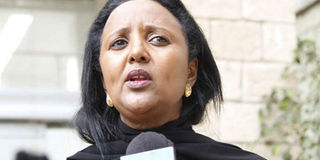Lobbying team explains how Amina’s win at AU will benefit Kenya

Kenya's Foreign Affairs Cabinet Secretary Amina Mohamed, who wants to be the next chairperson of the African Union Commission. PHOTO | JEFF ANGOTE | NATION MEDIA GROUP
What you need to know:
- Education Cabinet Secretary Fred Matiang’i, who chaired the Cabinet sub-committee, says her victory will place the country on the forefront of implementing a prosperity vision for Africa.
- Formed just after she submitted her name in October last year, the team, made up of five Cabinet secretaries, has toured 51 African countries seeking support for Ms Mohamed.
A team formed to lobby for Foreign Affairs Cabinet Secretary Amina Mohamed's candidature for African Union Commission chairperson says Kenya will draw more benefits from the continental bloc if she wins.
Education Cabinet Secretary Fred Matiang’i, who chaired the Cabinet sub-committee, says her victory will place the country on the forefront of implementing a prosperity vision for Africa.
“In today’s world, the reality is that many of our challenges and opportunities cannot be addressed by individual countries,” Dr Matiang’i told reporters at Harambee House on Monday.
“With an effective African Union Commission, we see Kenyans benefitting with the rest of the continent from employment and business opportunities derived from a more integrated continent and a bigger market,” he said.
It was the first time the sub-committee attempted to answer the persistent question of how Kenya will gain from her election into the continental body.
'FRUGAL' CAMPAIGN BUDGET
Formed just after she submitted her name in October last year, the team, made up of five Cabinet secretaries, has toured 51 African countries seeking support for Ms Mohamed.
It is closing its work this week with a tour of Guinea Bissau and Benin.
Yet they have had to defend the amount of money used in this campaign. Dr Mating’i told reporters the team has used a “very low” budget.
“We have been very frugal especially since this comes at a time where there are other pressing needs for the government,” he argued, but declined to specify the figure.
Africa is still not well connected and some of the sub-committee members have had to use chartered flights to make those trips.
On Monday, Dr Matiang’i was not specific about how many of those countries will support Kenya or how many of the expected jobs Kenya will expect, but he argued the Kenyan candidate will also bring honour and efficiency to the African Union.
“It will obviously put us in a position of leverage. We see Kenyans benefiting with the rest of the continent from better leverage to negotiate international agreements on climate change, the environment and conservation,” he said.
THE OTHER CANDIDATES
Ms Mohamed is competing with four other candidates to chair the commission when elections come up on Sunday in Addis Ababa, Ethiopia.
The other candidates are foreign minister Agapito Mba Mokuy (Equatorial Guinean), Moussa Faki Mahamat (Chad), Abdoulaye Bathily (Senegal), who is the UN representative in the Central Africa Republic, and Pelonomi Venson-Moitoi (Botswana).
She has campaigned on the platform of promoting integration, supporting young people and helping open up markets. She has argued that, consequently, she is best suited to implement Agenda 2063.
The vision, adopted in 2013, is meant to elevate Africa to prosperity by 2063 by promoting integration, boosting continental trade and ending violent conflicts.
THE AGENDA
Agenda 2063 has five 10-year planned phases and sees as key drivers projects such as the construction of high-speed train networks, improved access to cheaper energy, liberalising the airspaces and opening up borders for trade.
Its immediate target is to totally stop violence by 2020, an ambition the bloc may not achieve given the emergence of hotspots in South Sudan, the Central Africa Republic, Libya and Burundi.
Africa gobbles up about Sh75 billion ($750 million) annually to finance its peacekeeping missions on the continent.
But the continental body gets most of its money from donors, with the European Union, the US, Turkey and China contributing up to 70 per cent of its annual budget.
China financed the construction of the African Union's recently built headquarters in Addis Ababa, Ethiopia.




